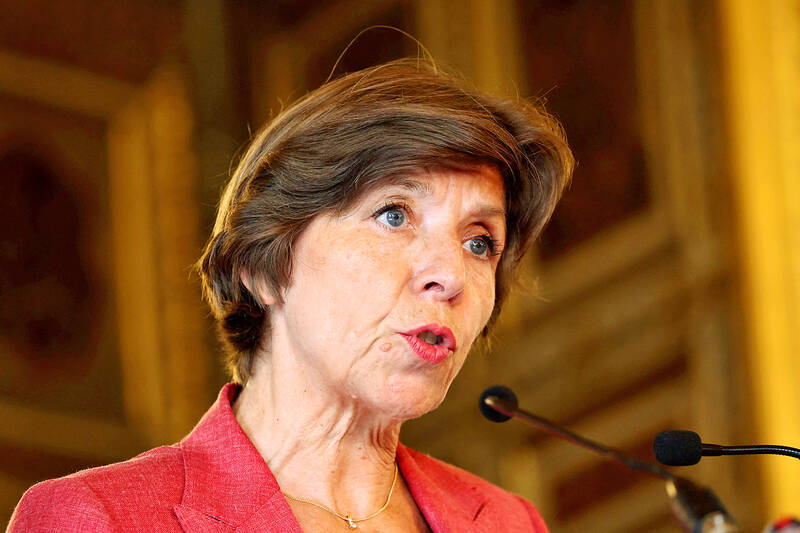French Minister for Europe and Foreign Affairs Catherine Colonna yesterday said it was up to Morocco whether to seek French aid in dealing with its deadliest earthquake in more than six decades and said France was ready to help if asked.
Paris and Rabat have had a difficult relationship in recent years, notably over the issue of Western Sahara, which Morocco wants France to recognize as Moroccan. Morocco has not had an envoy in Paris since January.
“This is a misplaced controversy,” Colonna told BFM television when asked why Morocco had not made an official request to Paris for urgent assistance, despite accepting help from Spain, Britain, Qatar and the United Arab Emirates.

Photo: Reuters
“We are ready to help Morocco. It’s a sovereign Moroccan decision and it’s up to them to decide,” she said.
Paris has made 5 million euros (US$5.4 million) available for non-governmental organizations operating in Morocco, Colonna said.
French officials have repeatedly tried to play down any rift between the two countries, but a visit by French President Emmanuel Macron has been postponed several times over the past year.
Morocco’s King Mohammed VI was in France when the quake hit, Colonna said.
French Minister of the Interior Gerald Darmanin told France 2 earlier yesterday that Rabat, a “brotherly” nation, had the capabilities to cope alone with the rescue efforts.
France has also walked a diplomatic tightrope with Rabat, as it sought to improve its relations with Algeria, Morocco’s arch rival and another of Paris’ former colonies. Algiers backs the Polisario Front, a group which has fought for decades for independence for Western Sahara.
Four French citizens died in the earthquake that has killed more than 2,000 people.
France had more than 51,000 people living in Morocco, foreign ministry figures showed.
According to the Observatory for Immigration and Demographics, France has a Moroccan diaspora of about 1.5 million people, including 670,000 dual nationals.

A new online voting system aimed at boosting turnout among the Philippines’ millions of overseas workers ahead of Monday’s mid-term elections has been marked by confusion and fears of disenfranchisement. Thousands of overseas Filipino workers have already cast their ballots in the race dominated by a bitter feud between President Ferdinand Marcos Jr and his impeached vice president, Sara Duterte. While official turnout figures are not yet publicly available, data from the Philippine Commission on Elections (COMELEC) showed that at least 134,000 of the 1.22 million registered overseas voters have signed up for the new online system, which opened on April 13. However,

EUROPEAN FUTURE? Albanian Prime Minister Edi Rama says only he could secure EU membership, but challenges remain in dealing with corruption and a brain drain Albanian Prime Minister Edi Rama seeks to win an unprecedented fourth term, pledging to finally take the country into the EU and turn it into a hot tourist destination with some help from the Trump family. The artist-turned-politician has been pitching Albania as a trendy coastal destination, which has helped to drive up tourism arrivals to a record 11 million last year. US President Donald Trump’s son-in-law, Jared Kushner, also joined in the rush, pledging to invest US$1.4 billion to turn a largely deserted island into a luxurious getaway. Rama is expected to win another term after yesterday’s vote. The vote would

ALLIES: Calling Putin his ‘old friend,’ Xi said Beijing stood alongside Russia ‘in the face of the international counter-current of unilateralism and hegemonic bullying’ Chinese President Xi Jinping (習近平) yesterday was in Moscow for a state visit ahead of the Kremlin’s grand Victory Day celebrations, as Ukraine accused Russia’s army of launching air strikes just hours into a supposed truce. More than 20 foreign leaders were in Russia to attend a vast military parade today marking 80 years since the defeat of Nazi Germany in World War II, taking place three years into Russia’s offensive in Ukraine. Putin ordered troops into Ukraine in February 2022 and has marshaled the memory of Soviet victory against Nazi Germany to justify his campaign and rally society behind the offensive,

CONFLICTING REPORTS: Beijing said it was ‘not familiar with the matter’ when asked if Chinese jets were used in the conflict, after Pakistan’s foreign minister said they were The Pakistan Army yesterday said it shot down 25 Indian drones, a day after the worst violence between the nuclear-armed rivals in two decades. Pakistani Prime Minister Shehbaz Sharif vowed to retaliate after India launched deadly missile strikes on Wednesday morning, escalating days of gunfire along their border. At least 45 deaths were reported from both sides following Wednesday’s violence, including children. Pakistan’s military said in a statement yesterday that it had “so far shot down 25 Israeli-made Harop drones” at multiple location across the country. “Last night, India showed another act of aggression by sending drones to multiple locations,” Pakistan military spokesman Ahmed